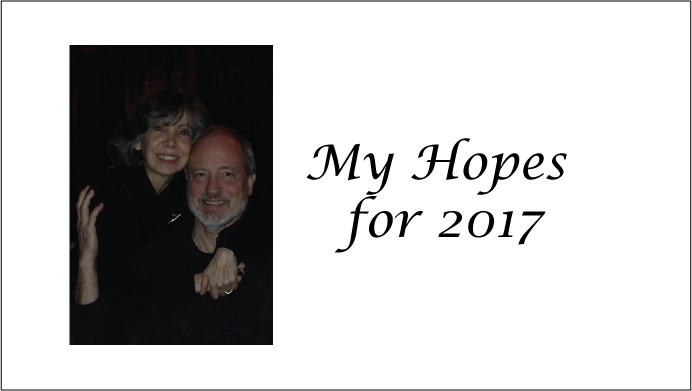January 2017 - The FoCuSeD™ Facilitator eNewsletter

My Hopes for 2017 | Gary Rush Facilitation
Since 2016 has been viewed as a not so good year, I wanted to look at 2017 with optimism. My hopes for 2017:
For all:
Let's eliminate polarizing groups. No one group has all the right answers and we need to work together to solve the problems facing humanity. We do this by replacing judgment with dialog.
Let's make collaboration a reality instead of a "buzzword". In 2016, much was written about collaboration, but it tended to focus more on tools and working together. I believe that collaboration is far more than that. We do this by building trust and understanding "how to" share ideas, listen, and build on each other's strengths.
Let's make Diversity a standard. The trend towards parochialism undermines diversity. Diverse environments are stronger – whether you are talking about sociology, science, other. We do this by embracing Diversity so racism becomes unacceptable.
Let's make fake news a thing of the past – this is not "freedom of speech". We need to hold our news sources accountable. We do this by not looking only for those who support our pre-conceived ideas, but looking for those that present facts instead of opinions.
Let's support peace. In 2016, for the first time, there was no armed conflict in the Western Hemisphere. We do this by supporting peace and those promoting peace to spread to all hemispheres.
For Companies:
I hope that companies realize the importance of preparing their people for the 21st Century. Technology is important but without people, where would technology be? The critical skills for success needed to prepare people for the 21st Century are: self-awareness and emotional intelligence, team building and trust, communication skills, critical thinking, innovative problem-solving, collaborative solutions, etc. As we move towards an era when outsourcing is commonplace, co-creating, co-working, and the gig economy increases, these critical skills become crucial.
I hope that companies realize that with Data, they need to develop a plan and a business model. Data, Big Data, IoT, etc., are all the rage, as they should be, but like many other trends (or fads) in the past, automation helps but companies need to understand what the data means, how it's to be used, and their needs. Without that, data is simply noise. Data needs understanding to become information and then knowledge.
I hope that companies realize that strategy is "not" dead – strategy is never dead. A fast-changing environment needs strategies more than tactics – you either lead or follow. With Strategies, you lead. However, companies need to realize that with Strategies, a living plan exceeds a static plan. You cannot create static strategies in this environment; they need to be flexible, agile, and understood by all – making it an ongoing process, not an event.
For Group Facilitation Skills:
I hope to see structured facilitation become less formal and more of a standard practice with group facilitation skills becoming a core skill set of many roles.
I hope to see companies recognize the importance of Group Facilitation Skills training. The ability to engage people in effective communication, decision-making, and problem-solving is a skill set that cannot be outsourced. Increasingly, these skills are being included as core competencies in many jobs/roles because they contribute to the overall well-being of any organization. They are trainable and make a significant impact to the bottom line.
I hope to see companies recognize that Process Skills are as important as People Skills. People skills are absolutely necessary, however the group must also build something of value – that requires a thought process. This is crucial to building something of value. A thought process is not a procedure – it is a thinking process that takes people from point A to Z in making decisions, solving problems, etc. Meetings without thought processes do not succeed. People Skills combined with Process Skills enable collaboration.
I hope to see Virtual Meetings become productive using group facilitation skills. These are viewed as cost-effective meetings by saving travel. They have become a standard, but virtual meetings do not enable teaming – trust is lacking. Implementing them requires thought to ensure engagement and overcome the barriers that impede teaming. In virtual meetings, building trust is crucial.
For me:
I hope to train all y'all this year!
I hope Millie, Sean, Al, and I continue to be healthy and close – working with your family is a challenging adventure and I wouldn't miss it for the world.
Last, but not least:
Thank you for your loyalty and I wish all y'all a Healthy and Prosperous Year! ![]()
FoCuSeD™ Facilitation – Let’s Do This!

